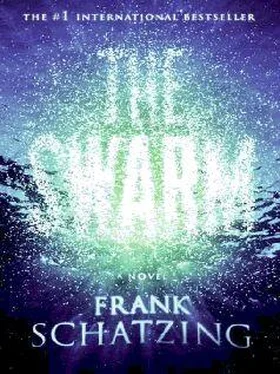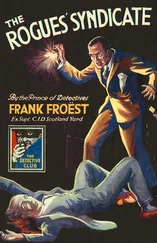'Project Sisyphus' was what Ford had called it.
But at least Anawak had plenty of time to devote to it. The station's reputation had been restored, and yet Davie's was closed. The waters off the west coast of Canada and North America were restricted to large vessels only. The disaster that had hit Vancouver Island had been repeated along the coast from San Francisco to Alaska. During the first wave of attacks, over a hundred smaller craft had been sunk or severely damaged. The number of casualties had fallen over the weekend, but only because no one was prepared to set sail unless they owned a freighter or a ferry. The media was awash with conflicting reports. Even the death toll was uncertain. Various government-appointed emergency-response teams had been brought in to deal with the situation, which meant that the skies were filled with helicopters whirring up and down the coast, laden with soldiers, scientists and politicians peering down at the ocean, each more helpless and bewildered than the next.
It was standard procedure for emergency committees to draw on outside advisers, and that was what the Canadian authorities had done. Vancouver Aquarium was co-opted as the hub of all science-based operations under the leadership of John Ford. Almost every marine-science or research institute was placed under his control. For Ford it was a weighty burden: he was leading a mission without knowing what it was. There was a protocol for everything from catastrophic earthquakes to terrorist nuclear attacks, but no one had prepared a brief for this . Ford lost no time in proposing Anawak as an additional adviser. If anyone in North America or Canada could understand what was going on inside a whale's head, it was him. And surely that was where they'd find their explanation. Whales were supposed to be intelligent, so had the creatures all gone mad? Or was something else affecting their behaviour?
Yet even Anawak, of whom so much was expected, was unable to help. He'd begun by assembling all of that year's telemetric data from the Pacific coast. Twenty-four hours ago he and Alicia Delaware had started to analyse the material, helped by staff at the aquarium. They'd pored over positioning data and listened intently to hydrophone recordings but they still had nothing to show for it. None of the whales had been carrying tags when they set out from Hawaii and Baja California towards the Arctic – with the sole exception of two humpbacks, who'd lost their transmitters almost as soon as they'd started migrating. The video shot by the woman on the Blue Shark seemed to be their only piece of evidence. They'd studied it at the Station with the help of some skippers who were adept at recognising flukes. After replaying the footage and magnifying the images, they'd identified some of the attackers: two humpbacks, a grey and several orcas.
Delaware had been right: the video was a valuable clue.
Anawak's aversion to her had soon evaporated. Delaware had a big mouth and seldom stopped to think before she spoke, but beneath her brash manner was an intelligent, analytical mind. Besides, she had time to help. Her parents lived in the British Properties, an exclusive district for Vancouver's elite. They gave her anything she wanted, but were hardly ever there. Anawak suspected that their financial generosity was an attempt to make up for their lack of interest, but their daughter didn't seem to care – she could spend their fortune and do as she pleased. Things had worked out perfectly: Delaware saw working with Anawak as an opportunity to back up her studies with practical experience, and he needed an assistant now that Stringer was dead.
Susan Stringer…
Every time he thought of her he was overcome with guilt for having failed to save her. He had told himself that nothing he or anyone else could have done would have freed her from the orca's jaws, but the uncertainty remained. What good were all his papers and articles about intelligence in marine mammals if he couldn't understand a whale's thought processes? Was it possible to convince an orca to let go of its prey?
He reminded himself continually that orcas were animals – highly intelligent ones, but animals all the same. And prey was prey.
But orcas didn't prey on humans. Had the whales eaten the people drifting in the water or just killed them?
Anawak sighed. He wasn't making any progress. The burning in his eyes was getting worse. Half-heartedly he picked up another disk of digital images, then put it back. He couldn't concentrate. He'd spent the whole day at the aquarium, discussing findings or calling people, and now he felt drained. Wearily he switched off his computer. It was gone seven. He got up and went in search of John Ford. The director was in a meeting, so he called in on Delaware, who was studying satellite data.
'Fancy a juicy whale steak?' he asked glumly.
She looked up with a smile in her eyes. She'd swapped her blue glasses for contact lenses, but her irises were still suspiciously violet. Apart from the buck teeth, she was actually very attractive. 'Sure. Where do you want to go?'
'The snack bar on the corner's not bad.'
'Snack bar?' she said in amusement. 'I don't think so. Come on, I'll treat you.'
'There's no need.'
'Let's go to Cardero's.'
'Christ!'
'They do great food.'
'I know, but firstly, I can pay for myself, and secondly, Cardero's is… well, it's…'
'It's fabulous?
Cardero's was situated amid the yachts of Vancouver's Coal Harbour. It was a big place with large windows and high ceilings – one of the trendiest outfits in town. The restaurant offered stunning views and good west-coast cuisine, while the adjoining bar was filled with the young and chic, laughing and sipping drinks. In his frayed jeans and laded sweater Anawak could hardly have been less appropriately dressed, but he always felt uncomfortable and out of place in smart restaurants. He couldn't deny that Delaware belonged there, though.
So, Cardero's it was.
They took his old car and drove to the harbour. They were in luck. It was usually necessary to book at Cardero's, but one table was empty. It was a little removed from the bustle of the main restaurant, which was perfect for Anawak. They ordered the house specialty – salmon baked with soy, brown sugar and lemon on a cedar plank.
'OK,' said Anawak, once their order had been taken. 'What have we got?'
'Nothing,' said Delaware. 'I'm baffled.'
Anawak rubbed his chin. 'Well, maybe I've found something. The video footage put me on to it.'
'My video footage, you mean.'
'Yes,' he admitted, and added ironically, 'We're all very grateful.'
'Well, you should be, if it's given you a lead.'
'It's the whales we identified. Only transient orcas were involved in the attacks, not a single resident.'
'You're right.' She wrinkled her nose. 'We haven't heard anything bad about residents.'
'The Johnstone Strait was clear of attacks – even though it was full of kayaks at the time.'
'So the threat's being posed by the newcomers.'
'By transients, and maybe offshore orcas too. The grey and the two humpbacks on the video were all transients. All three whales spent the winter in Baja California – we've got it all on file. We emailed pictures of their flukes to the institute in Seattle, who confirmed that the whales have been seen there several times in recent years.'
'So what's the big deal? Everyone knows that greys and humpbacks migrate.'
'Not all of them.'
'I thought…'
'Something weird happened the second time we went out that day. I'd practically forgotten about it after everything else. We were desperate to get the people off the Lady Wexham , but the boat was sinking and a group of greys was trying to ram us. I couldn't see any of us getting out of there alive, let alone saving anyone. Then two more greys appeared alongside us, and lay there in the water until the others backed off.
Читать дальше












